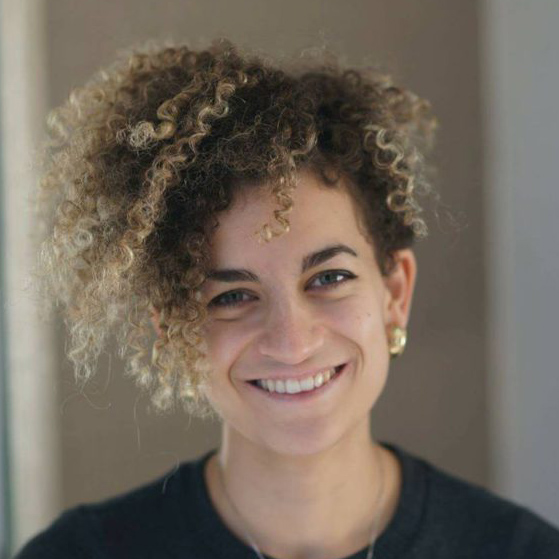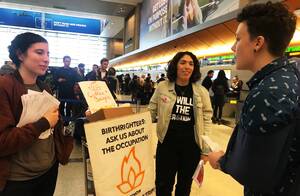“Responsible Travel in the Region Is Possible”
The anti-occupation movement urgently needs ambassadors who have been on the ground.
This article is part of a roundtable on the ethical response to Birthright. Click here to read the rest of the conversation.

THE CHOICE CONFRONTING many young American Jews, between coming to Israel with Birthright or not coming at all, is a false one. There are ways to visit Israel/Palestine in addition to Birthright, whether it’s extending your trip in Israel to travel in Palestine or joining an alternative trip. One does not need to eliminate the possibility of responsible travel in the region altogether.
As an anti-occupation Israeli activist, I have the honor of leading tours into the West Bank on a weekly basis as part of Breaking the Silence, an organization of former IDF veterans who speak out against our country’s military subjugation of millions of Palestinians. My work focuses on outreach to Jews in the diaspora who want to see a different side of the story from what they have been taught through propaganda campaigns and hasbara. I lead people through the segregated streets of Hebron, where Palestinians have been restricted from walking for the past 25 years, ever since the Baruch Goldstein Massacre in 1994. We meet with young Palestinian activists resisting the occupation nonviolently and building their communities. I share with visitors my experiences as a soldier in the Civil Administration, offer insight into the bureaucracy and legal systems of the occupation, and present the testimonies of hundreds of other IDF veterans from the West Bank and Gaza.
Again and again, I hear participants on these trips say that there is nothing like witnessing the occupation firsthand, and I have personally seen how this act of witness turns people on the fence into advocates for Palestinian rights and equality, and for peace in the region. Some activists argue that there is no ethical way to travel to the region, and I am sensitive to their argument, but I believe that denying an Airbnb in Tel Aviv an extra $50 is not going to be what ends the occupation. What our progressive, anti-occupation camp urgently needs is ambassadors who have been on the ground, spoken to key players, and observed the discrimination and oppression facing Palestinians—and who will advocate for a just future.
Jewish communities in the diaspora have, to a significant extent, tied their fate to the Jewish state. For many diaspora Jews, blind support of Israeli policy has become the default position. Israel has used supposed threats to its security to undermine any criticism from diaspora Jews, and the fear of being labeled self-hating Jews has silenced many would-be critics. Meanwhile, newer progressive Jewish organizations like IfNotNow, J Street, and Jewish Voice for Peace have all offered alternatives to the establishment consensus. While older members of the Jewish establishment remain silent in the face of dangerous incitement by Benjamin Netanyahu and the far right, as well as explicit plans to annex parts of the West Bank, younger Jews are increasingly feeling a duty to fix what their parents’ generation has broken.
Birthright was created in order to connect Jews to Israel in its current form. It systematically ignores decades of occupation, and while it claims not to engage in politics, it presents mostly right-wing views and works to glorify Israel’s military actions. Rather than talk about the occupation itself, which lies at the crux of the criticism against Israel, Birthright and similar groups traditionally talk about cherry tomatoes, the tech industry, and “Israel’s right to exist.” By casually swaying the conversation away from human rights abuses, hasbara efforts seek to delegitimize any criticism. The conversation becomes about whether Israel should exist, when the actual pressing issue is whether it should continue to deny Palestinians their basic rights.
Birthright’s function is to conceal the humiliation and brutality of the occupation. There is no better rejection of this approach than to come and see it for yourself, to visit Israel/Palestine and learn not only about Palestinian resistance, but about Israeli resistance too. While we understand full well that the occupation won’t end by Israeli efforts alone, we also know that it won’t happen without us.
At Breaking the Silence, it is not an explicit part of our mission to convince diaspora Jews to come to the region. But if you care about the future of the people who live in this land, find a way to come and connect with us, and to amplify the voices of Israelis and Palestinians struggling to create a just future.
Frima “Merphie” Bubis served in the IDF from 2013-2015 in the West Bank’s Civil Administration. She joined Breaking the Silence in 2016, and manages the organization’s outreach to the Jewish diaspora.

